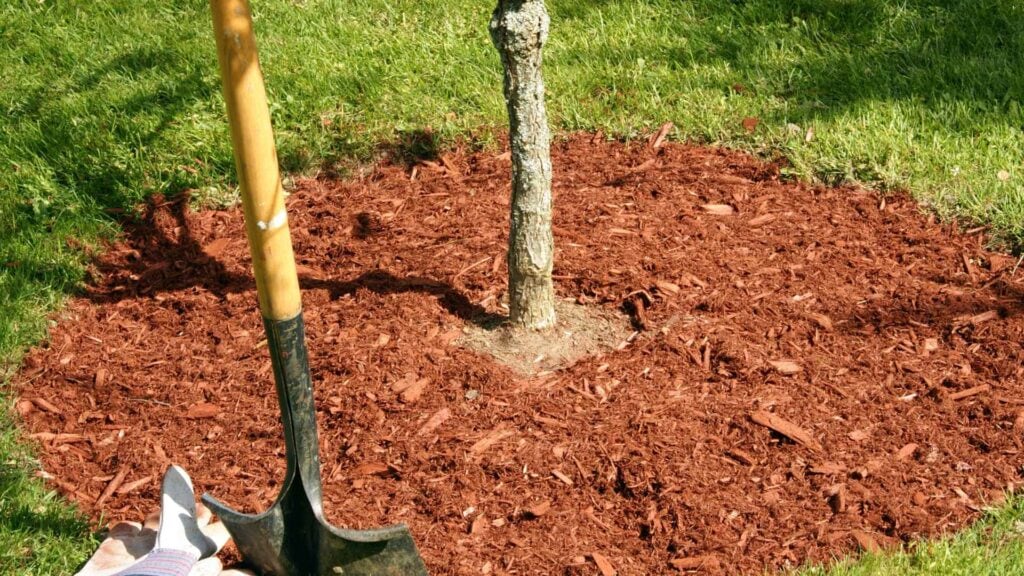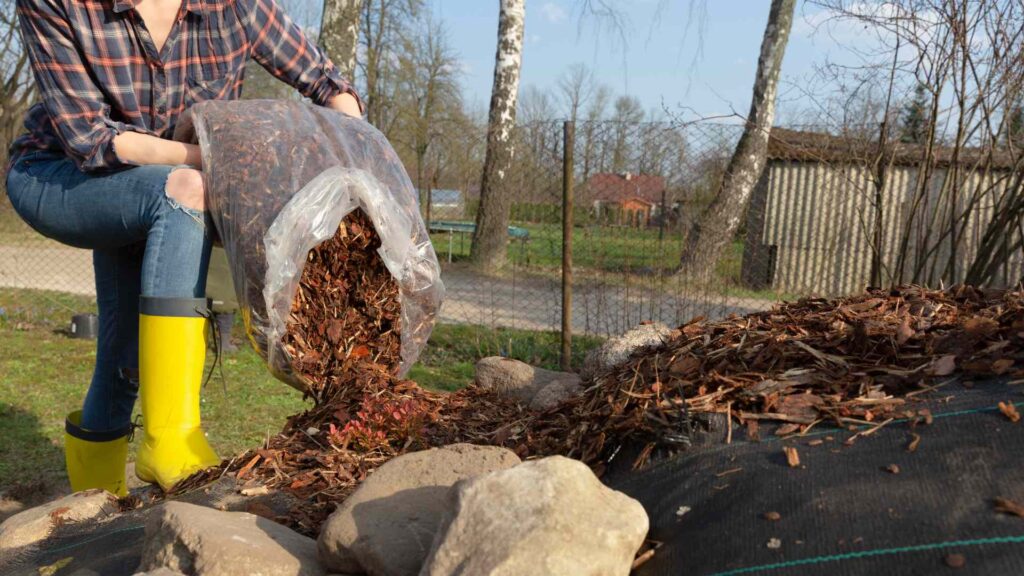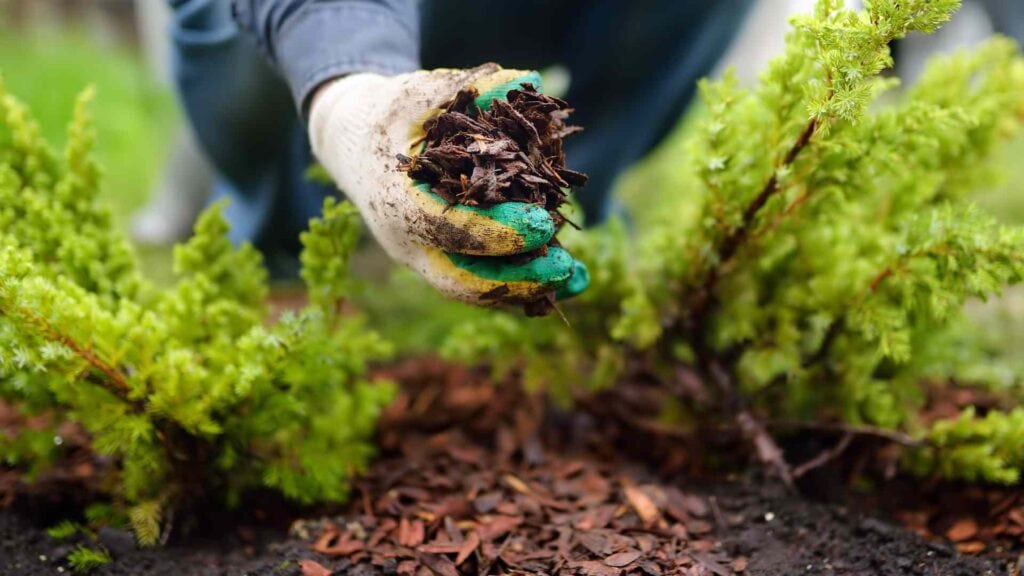Pruning, watering, and fertilising trees are some of the first things that come to mind when considering tree maintenance. While each of these factors is critical to the health of our green friends, one of the most important factors is often overlooked: mulch.
Mulch, the unremarkable material layer around a tree's base, rarely gets much recognition. It's time to shed light on this little-known but crucial part of tree care and discover how it might prolong the health and vitality of your favourite trees.
This blog will investigate mulch in great detail, learning its numerous uses and secrets. Mulch is a multipurpose and vital tool for tree care, helping with anything from conserving water to enhancing soil quality. So, come with us as we peel back the layers of the tree and learn how mulch improves the health of trees and the quality of the soil they sit in.

Definition of Mulch
Mulch is spread over a garden or landscape to help it retain moisture, prevent weeds from sprouting, keep the soil and plant roots cool, shield them from frost heaving in the winter, and improve its aesthetic value. Keep reading to understand the many varieties of mulch and recommendations for the best mulch to use in your garden.
Finding the Perfect Mulch
While some mulches are purely decorative, others provide a practical purpose by enriching the soil. Both organic and inorganic mulch have their benefits and drawbacks, each with its category.
Organic Mulch
This mulch is entirely organic, devoid of any synthetic components. It's great for boosting your garden's nutrient content and can help keep weeds at bay without completely blocking them out.
Advantages of Using Organic Mulch
Improves Soil Quality and Plant Nutrition
Long-term, organic mulches improve soil quality by reintroducing naturally occurring nutrients. Using compost instead of commercial fertilisers will give your grass all the nutrients it needs to thrive, including nitrogen, phosphorus, and potassium.
Attracts Soil Organisms and Microbes That Are Good for the Garden
Mulch with a high nutrient content (mainly compost) is a great way to bring earthworms and other soil-improving organisms into your garden. The castings (excrement) of earthworms contribute even more nutrients to your soil, completing a virtuous cycle that promotes healthy plant growth.
Boosts the Quality and Structure of the Soil
Organic mulch improves sandy soil's water-holding capacity and reduces clay soil compaction. The addition of these nutrients naturally improves the soil.
Restores Stability to Degraded Areas
Sturdy wood chips and interlocking pine needles are ideal for slopes and ridges because they prevent silt from washing away during rainstorms. They keep the soil from crusting over and allow water to percolate easily.
Your Garden Won’t Become Too Hot
While stones, gravel, and black plastic mulches may insulate your plants throughout the winter, they might overheat them in the summer.
Much More Affordable Than Inorganic Mulches.
Organic mulches, in contrast to stones and landscape fabric, don't cost anything. You utilise your lawn clippings or produce your compost to save money and benefit the world.
The Downsides of Using Organic Mulch
It Needs to Be Replaced Regularly
Organic mulch decomposes over time, so it must be replaced annually or every few years, depending on the mulch you use. However, although pine needles and seasoned wood chips can be used for several years, grass clippings and straws must be renewed every year.
Mulching With New Wood Can Have a Short-Term Negative Effect on Soil Nitrogen Levels
Decomposing organic mulches provides long-term benefits to your grass, but nitrogen-hungry plants may suffer from the presence of recently cut wood. Fertiliser should be applied at the proper time. However, while fresh wood chips are great for use around trees and shrubs, they shouldn't be used in annual flower or vegetable gardens.
Weed Seeds May Be Present in Some Mulches
Homeowners who spread mulch to eliminate weeds may be disappointed to find weed seeds in organic mulches like straw and grass clippings. Don't use hay on your lawn to keep it weed-free.
Pests Are Often Attracted to Moist Wood Mulches
Wood mulches are great at keeping water, appealing to pests like termites and roaches. Putting wood mulches close to your home's foundation is a recipe for disaster. Gravel is a good option if you want to keep pests at bay.
Inorganic Mulch
This mulch is artificial rather than organic. It's superior to organic in weed control, water retention, and shelf life but doesn't improve soil quality.
Advantages of Using Inorganic Mulch
Long-Term
Since inorganic mulch either doesn't disintegrate or takes a very long time, it doesn't need to be replaced very often. You won't have to replace the rocks and fabric annually. If you use an inorganic mulch, you might not have to renew it for as long as five years.
Adaptable and Visually Appealing
Stone mulches of varying colours make beautiful accents for lawns around patios, walkways, and other hardscaping elements. Stones from a river are ideal for use in a rock garden or a rain garden.
Doesn’t Include Any Weed Seeds
Weeds are not concerned with inorganic mulch because it contains no organic waste like straw, hay, or grass clippings.
Maintains Soil Nitrogen Levels
Although fresh wood mulch temporarily depletes nitrogen levels in the soil, inorganic mulch has no such effect.
Keeps Pests Away
Wet mulches made of wood will bring pests to your home's foundation. Applying a 6- to 12-inch layer of gravel around your home's foundation will help prevent termites and roaches by reducing moisture levels and making the region less appealing to these pests.
The Downsides of Using Inorganic Mulch
Stone Mulches Provide Long-Lasting Soil Improvement
Stone mulches can break down over time, making replanting grass seedlings difficult. A lot of digging and stone removal needs to be done before you can plant anything.
Water and Air Can Be Blocked by Using Plastic Sheeting
Lack of air circulation, as provided by plastic sheeting without punctures, can lead to root rot. When it comes to landscaping, black plastic should be avoided.
The Rocks Both Retain and Radiate Heat
Reflected heat from rocks during the hot, dry summer months can harm nearby vegetation, burn root systems, and cause human and canine feet discomfort.
Landscape Fabric Can Suffocate Worms
Landscape cloth is more porous than plastic sheeting, although it can still become dirt-covered. This can suffocate beneficial organisms like earthworms and prevent water from passing through.

Mulch Is Best for Reducing Garden Water Needs
- Mulching soil may be an excellent way to prevent weeds in a garden bed. A good mulch coat prevents weed development.
- Mulch provides homes and refuge for insects and other small critters, increasing yard biodiversity.
- Maintaining mulch in your garden will significantly reduce evaporation.
- Mulch slowly degrades, increasing soil composition and minimising compacting
- Mulch also regulates soil temperature, protecting plants and trees from summer temperature swings.
- Mulch also shields plants from weed wackers and lawnmowers.
- Weeds are unattractive and drain nutrients and water from garden plants. Mulching helps the soil retain moisture and nutrients so plants can absorb them and not dry out while you're at work or on hot days.
Pouring Water Over Mulch
After you've finished planting, weeding, and mulching your garden, maintaining its moisture levels should be a breeze. At the start of the season and for the first three to four weeks after planting, you should give your garden a good soaking at least once a week. Your garden should survive with only natural rainfalls or within watering limitations during the summer if you have superb soil, a nice layer of mulch, and water-efficient plants.
Tips for Mulching
The most significant time to spread mulch for optimal plant health is in the middle of April. Removing any weeds in the bed is essential if this is your first mulching. If you have a mulch layer from last year, rake it or remove some before adding more. If you mulch too deeply each year, you risk creating a mulch that won't disintegrate and stunts your plants' root development. Maintain a consistent height between 5 and 7.5 centimetres.
Mulch should also always be balanced against the bases of trees. A tree's trunk can decay if there is too much mulch around it, and the mulch itself might attract insects that will eat away at the tree. It also prompts the tree to send out new roots to escape the decay. This can cause the original, deep roots to dry up, leaving your tree susceptible to drought. Keep mulch at least 2.5-5 cm away from the crown of your plants to ensure enough air circulation.
There Are Even More Benefits to Mulching Your Trees
Mulching around trees improves the aesthetics of your environment and is suitable for the trees' overall health.
Mulch for your yard can be made from organic or synthetic materials like fabric, rubber, or plastic. Mulches made of natural materials that break down over time are considered organic. This includes bark chips, straw, grass clippings, leaves, compost, grape pomace, sawdust, and rice hulls. Inorganic mulch is less expensive than organic mulch but provides different benefits.
Mulch Helps Keep Soil Moist for Longer
The use of mulch can cut down on water loss due to evaporation. Up to 80% of supplemental soil moisture can be retained by using mulch. This is paramount because of the importance of water conservation in dry climates. Keep the soil from drying out by shading it from the sun. Organic mulches also reduce runoff by absorbing some of the shock of rainfall.
Weeds Can’t Grow in Mulch
Invasive weeds can deprive desirable vegetation of vital resources like water, nutrients, and sunshine. Weeds require direct sunshine for germination and growth. A thick layer of mulch, about two to three inches deep, can suppress weed development. This will prevent weed seed germination by preventing sunlight from reaching the soil's surface. Too much mulch might suffocate the soil, so ensure your layer isn't more profound than three inches.
Mulch Controls the Temperature of the Roots
Temperature swings inhibit and impede tree development. Trees benefit from mulch because it acts as an insulator year-round, moderating temperature changes that could otherwise stunt their development. Mulches that insulate the ground are beneficial for preventing the soil beneath evergreens from freezing so that their roots can absorb moisture during the winter and for keeping the roots of newly planted trees and shrubs actively growing for as long as feasible.
Mulch Increases Soil Nutrients
Over time, organic mulches decompose and return soil nutrients. The soil's fertility will improve when these fertilisers are added. Mulch your trees in mid to late spring so the soil can warm up all summer. Add organic mulch to guarantee further that your soil absorbs as many nutrients as possible.
Mulch Mitigates Soil Compaction
Pressing soil particles together reduces the pore space between them and causes soil compaction. This compromises the soil's ability to absorb and drain water, negatively affecting the tree's health. Mulches prevent root stress and poor plant health caused by wind, water, compaction, and traffic-induced erosion. A thick layer of organic mulch will shield the tree from the elements and decrease soil compaction.
Conclusion
Mulch is a crucial part of tree care, helping to conserve water, prevent weeds from sprouting, keep soil and plant roots cool, shield them from frost heaving in the winter, and improve its aesthetic value. It is spread over a garden or landscape to help retain moisture, prevent weeds from sprouting, keep the soil and plant roots cool, shield them from frost heaving in the winter, and improve its aesthetic value.
Organic mulch is an organic material that improves soil quality and plant nutrition by reintroducing naturally occurring nutrients. It attracts soil-improving organisms and microbes, enhances the quality and structure of the soil, restores stability to degraded areas, and is more affordable than inorganic mulch. However, it requires regular replacement due to decomposition and can have a short-term negative effect on soil nitrogen levels.
Inorganic mulch is artificial and superior in weed control, water retention, and shelf life but doesn't improve soil quality. Advantages of inorganic mulch include long-term use, adaptability, visual appeal, absence of weed seeds, maintenance of soil nitrogen levels, and keeping pests away. However, it can break down over time, block air circulation, retain and radiate heat, and suffocate beneficial organisms like earthworms.
In conclusion, mulch is a multipurpose and vital tool for tree care, helping to maintain the health and vitality of trees. It is essential to choose the right mulch for your specific needs and preferences.
Mulch is a crucial tool for reducing garden water needs, preventing weeds, and increasing yard biodiversity. It also helps regulate soil temperature, protects plants from summer temperature swings, and shields plants from weed wackers and lawnmowers. Mulch helps the soil retain moisture and nutrients, preventing plants from drying out during hot days. To maintain optimal plant health, it is essential to spread mulch in mid-April, removing any weeds in the bed, and maintaining a consistent height between 5 and 7.5 centimeters.
Mulch can be made from organic or synthetic materials, such as bark chips, straw, grass clippings, leaves, compost, grape pomace, sawdust, and rice hulls. Organic mulches can help keep soil moist for longer, retain up to 80% of supplemental soil moisture, and suppress weed development. It also controls the temperature of the roots, acting as an insulator year-round, and increases soil nutrients over time.
Mulch also mitigates soil compaction, preventing root stress and poor plant health caused by wind, water, compaction, and traffic-induced erosion. To ensure optimal plant health, give your garden a good soaking at least once a week after planting, and maintain moisture levels throughout the season.
Content Summary:
- It's time to shed light on this little-known but crucial part of tree care and discover how it might prolong the health and vitality of your favourite trees.
- This blog will investigate mulch in great detail, learning its numerous uses and secrets.
- Mulch is a multipurpose and vital tool for tree care, helping with anything from conserving water to enhancing soil quality.
- So, come with us as we peel back the layers of the tree and learn how mulch improves the health of trees and the quality of the soil they sit in.
- Mulch is spread over a garden or landscape to help it retain moisture, prevent weeds from sprouting, keep the soil and plant roots cool, shield them from frost heaving in the winter, and improve its aesthetic value.
- Keep reading to understand the many varieties of mulch and recommendations for the best mulch to use in your garden.
- Both organic and inorganic mulch have their benefits and drawbacks, each with its category.
- The castings (excrement) of earthworms contribute even more nutrients to your soil, completing a virtuous cycle that promotes healthy plant growth.
- While stones, gravel, and black plastic mulches may insulate your plants throughout the winter, they might overheat them in the summer.
- Organic mulch decomposes over time, so it must be replaced annually or every few years, depending on the mulch you use.
- However, although pine needles and seasoned wood chips can be used for several years, grass clippings and straws must be renewed every year.
- Decomposing organic mulches provides long-term benefits to your grass, but nitrogen-hungry plants may suffer from the presence of recently cut wood.
- Fertiliser should be applied at the proper time.
- However, while fresh wood chips are great for use around trees and shrubs, they shouldn't be used in annual flower or vegetable gardens.
- Homeowners who spread mulch to eliminate weeds may be disappointed to find weed seeds in organic mulches like straw and grass clippings.
- Don't use hay on your lawn to keep it weed-free.
- Putting wood mulches close to your home's foundation is a recipe for disaster.
- Gravel is a good option if you want to keep pests at bay.
- This mulch is artificial rather than organic.
- It's superior to organic in weed control, water retention, and shelf life but doesn't improve soil quality.
- Stones from a river are ideal for use in a rock garden or a rain garden.
- Although fresh wood mulch temporarily depletes nitrogen levels in the soil, inorganic mulch has no such effect.
- Wet mulches made of wood will bring pests to your home's foundation.
- Stone mulches can break down over time, making replanting grass seedlings difficult.
- When it comes to landscaping, black plastic should be avoided.
- Mulching soil may be an excellent way to prevent weeds in a garden bed.
- A good mulch coat prevents weed development.
- Maintaining mulch in your garden will significantly reduce evaporation.
- Mulch also shields plants from weed wackers and lawnmowers.
- Your garden should survive with only natural rainfalls or within watering limitations during the summer if you have superb soil, a nice layer of mulch, and water-efficient plants.
- The most significant time to spread mulch for optimal plant health is in the middle of April.
- If you mulch too deeply each year, you risk creating a mulch that won't disintegrate and stunts your plants' root development.
- Mulch should also always be balanced against the bases of trees.
- Keep mulch at least 2.5-5 cm away from the crown of your plants to ensure enough air circulation.
- Mulching around trees improves the aesthetics of your environment and is suitable for the trees' overall health.
- Mulch for your yard can be made from organic or synthetic materials like fabric, rubber, or plastic.
- Up to 80% of supplemental soil moisture can be retained by using mulch.
- Keep the soil from drying out by shading it from the sun.
- Mulch your trees in mid to late spring so the soil can warm up all summer.
- Add organic mulch to guarantee further that your soil absorbs as many nutrients as possible.
- A thick layer of organic mulch will shield the tree from the elements and decrease soil compaction.
FAQs About Mulch's Role in Tree Care
Various materials can be used as mulch, including wood chips, bark, straw, leaves, grass clippings, and even rocks. Organic mulches, like wood chips, also break down and enrich the soil.
Both organic and inorganic mulches have their advantages. Organic mulches improve soil quality over time and provide nutrients, while inorganic mulches like gravel or stone offer longer-lasting weed control and don't break down.
Yes, mulch can harm trees if misused. Over-mulching or piling mulch against the tree trunk can lead to rot and other issues. Follow recommended mulching guidelines.
Mulch helps control weeds by blocking sunlight from reaching weed seeds, preventing their growth. It also makes it easier to pull weeds that do sprout.
While mulch does not typically attract pests or diseases, using diseased wood chips or mulching too close to the trunk can create a favourable environment for pests and diseases. Choose healthy mulch materials and maintain proper spacing.

